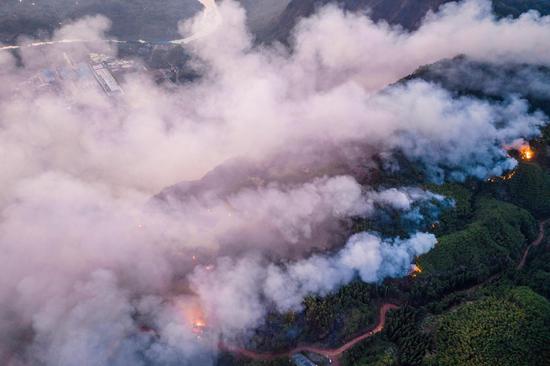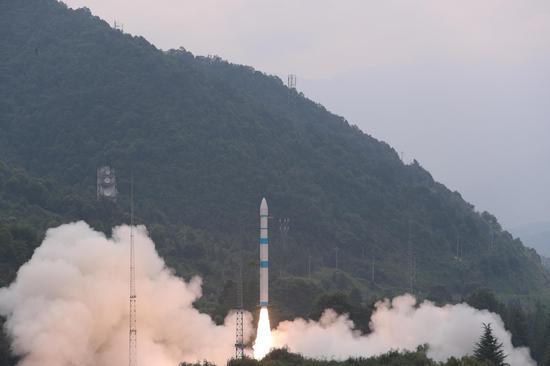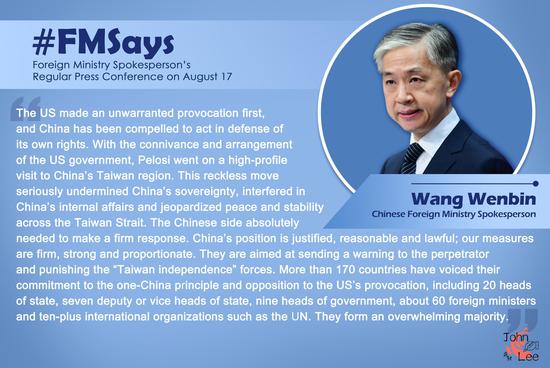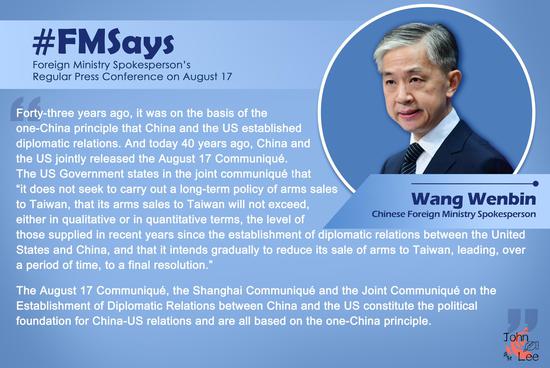Fact No. 11: The responsibility for the suspension of China-U.S. climate talks is on the United States.
When it comes to climate change and other issues about global governance on the environment, China will stay committed to international cooperation and continue to honor our commitments with real actions.
China has been making utmost efforts to scale up its response to climate change. In 2020, China announced new targets for its nationally determined contributions. We will strive to peak carbon dioxide emissions before 2030 and achieve carbon neutrality before 2060. We are committed to moving from carbon peak to carbon neutrality in a much shorter time span than what might take many developed countries.
China has been working steadfastly toward its carbon peak and carbon neutrality targets. Since President Xi Jinping declared those targets in 2020, the Chinese government has announced major domestic policy measures on climate response on multiple occasions, and continued to build a 1+N policy framework on carbon peak and carbon neutrality. In October 2021, the Working Guidance for Carbon Dioxide Peaking and Carbon Neutrality in Full and Faithful Implementation of the New Development Philosophy issued by the Central Committee of the Communist Party of China and the State Council and the Action Plan For Carbon Dioxide Peaking Before 2030 were released, which together became the top-arching design running through the two phases of carbon peak and carbon neutrality of China. Implementation plans by sectors, including energy, energy-saving and emissions reduction, circular economy, green consumption, industrial development, urban and rural development and transport, have been introduced. The 1+N policy framework is basically put in place.
China has followed the philosophy of ecological development and has made achievements in green transition. President Xi Jinping’s quote that clear water and green mountains are as valuable as gold and silver has become a shared view among the Chinese public. In 2020, China’s carbon emissions intensity dropped by 18.8 percent compared to that of 2015, overachieving the binding target laid out in the 13th Five-Year Plan. It dropped 48.4 percent from the 2005 level, meaning China had overachieved the target of reducing the intensity by 40 to 45 percent in 2020 compared to 2005, a commitment China made to the world. China reduced about 5.8 billion tonnes of CO2 emissions in cumulative terms, and the rapid growth of CO2 emissions was largely reversed. Since the beginning of this century, China has accounted for a quarter of the world’s new afforestation. China has met the previous goals for its pollution prevention and control tasks were completed with remarkable success, and significantly reduced the number of heavy pollution days. In the report released in June 2022, the Energy Policy Institute at the University of Chicago pointed out that PM2.5 pollution fell in China by almost 40 percent between 2013 and 2020, which is almost equivalent to what the U.S. reduced over 30 years after 1970.
China’s contributions on energy conservation, energy efficiency, development of renewable energy, transportation, and construction basically all account for 30 to 50 percent of the global total. In 2021, non-fossil energy accounted for 16.6 percent of energy consumption in China. China was the top consumer of non-fossil energy in the world. China’s use of renewable energy and total installed power generation capacity have reached record highs, with the installed scale of hydropower, wind power, photovoltaic and biomass power generation staying at the top of the world. China is committed to reaching a total installed capacity of 1.2 billion kilowatts of wind and solar power by 2030, which alone will exceed the total installed power capacity of the U.S.. China’s production and sales of new energy vehicles have ranked first in the world for seven consecutive years. China’s installed share of coal power generation dropped historically to below 50 percent in 2020, total emissions from the coal power industry fell by nearly 90 percent over a decade, and coal consumption of thermal power units has been reduced significantly, saving over 700 million tonnes of raw coal over the decade.
China actively promotes the building of a fair, reasonable, cooperative and mutually beneficial global climate and environmental governance system. As an important participant in global climate governance, China has always actively participated in the main-channel negotiations on climate change and made historic contributions to the conclusion of the United Nations Framework Convention on Climate Change and its Kyoto Protocol and the Paris Agreement. China hosted Part I of the 15th meeting of the Conference of the Parties to the Convention on Biological Diversity in October 2021, which injected fresh impetus into global governance on biodiversity.
China strongly supports the development of green and low-carbon energy in developing countries. China upholds the concept of “teaching people to fish” and does its best to help developing countries, especially small island countries, African countries and LDCs, to reduce the adverse impact of climate change and improve their capacity to cope with it. Over the past 10-plus years, China has invested about 1.2 billion yuan in South-South cooperation on climate change and signed 40 cooperation documents with 35 countries. For nearly eight years up to 2021, China had implemented more than 200 Chinese aid projects to help other countries address climate change, provided energy-saving and new energy products and equipment to nearly 40 countries, and trained about 2,000 officials and professionals in the field of climate change for 120 developing countries. In April 2022, China launched the China-Pacific Island Countries Climate Action Cooperation Center to add new momentum to climate action in small island countries.
The U.S. has a poor track record on climate change. The U.S. is the world’s largest emitter of greenhouse gases in cumulative terms. Its per capita carbon emissions have remained high. They are more than double those of China. The U.S. refuses to ratify the Kyoto Protocol. It withdrew from the Paris Agreement at one point, and is slow to fulfill its financial commitments under the Green Climate Fund. It has also used the so-called Xinjiang-related issues as a pretext to sanction and suppress Chinese photovoltaic companies, hindering the global development of new energy. The U.S. has not yet joined the Convention on Biological Diversity, and has long stayed outside the global biodiversity protection system.
Since the Copenhagen Climate Change Conference in 2009, the U.S. still has not earnestly fulfilled its commitments of providing climate finance for developing countries. According to a report released by the World Resources Institute in October 2021, indicators including GDP and cumulative greenhouse gas emissions suggest the U.S. should contribute between 40 and 47 percent of the total 100 billion U.S. dollars climate finance effort in 2018. But the U.S. provided less than 20 percent of its due share with a shortfall of at least 21 billion U.S. dollars and up to 40 billion U.S. dollars. The U.S. lack of credibility and due responsibility has severely undermined the process of global climate governance.
In June 2022, a U.S. Supreme Court’s ruling decided that the Environmental Protection Agency has no right to limit greenhouse gas emissions at the state level, and cannot force power plants to move away from fossil fuels and toward renewable energy. This decision will further undermine the Biden administration’s capability to respond to climate change. Stéphane Dujarric, Spokesperson for the UN Secretary-General, indicated at the regular noon briefing that the U.S. Supreme Court’s ruling is a setback in the global fight against climate change and makes it even more difficult to meet the goals of the Paris Agreement.
China will, as always, actively participate in international and multilateral cooperation to address climate change. China will continue to unswervingly move toward the targets of carbon peak and carbon neutrality, actively participate in main-channel negotiations on climate change, provide support and assistance to developing countries to the best of its capabilities, and make its own contribution to addressing the global challenge of climate change.
The cooperation between China and the U.S. in the field of climate change cannot be separated from the overall environment of China-U.S. relations. Due to the egregious impact of Pelosi’s provocative visit to Taiwan, China had to suspend the bilateral climate talks with the U.S.. All consequences arising therefrom shall be borne by the U.S.. The U.S. needs to stop looking for new excuses for its inaction on climate change.


















































 京公网安备 11010202009201号
京公网安备 11010202009201号